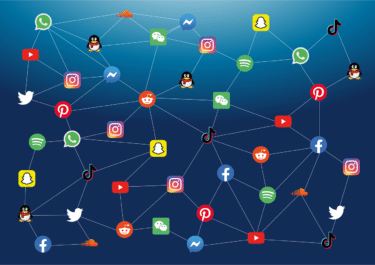The red iPhone buzzed abruptly as another WhatsApp notification lit up its screen. I smiled and gestured that it was fine – we were done with the interview now. Agnes, 55, had resisted picking up her mobile phone during our hour-long chat amidst the frequent buzz of incoming messages. But the vigour with which she snatched up her device betrayed her seemingly poised demeanour – her self-control had been wearing precariously thin.
As a recipient and spreader of conspiracy-laden messages on WhatsApp, Agnes prides herself as an informed global citizen. But much of what she has told me deviates significantly from mainstream news.
“You know, COVID-19 is really a man-made chemical weapon made in a lab in China,” Agnes said. “It’s all part of China’s plan to take over the world.”
The outbreak of COVID-19 has upended our world – but nothing had prepared us for the attendant outbreak of conspiracy theories to explain this unprecedented phenomenon.
The conspiracy theory is a familiar beast that seems to come especially alive during times of change and crisis. An individual or an organised group emerges as the criminal puppet-master against the backdrop of a grandiose struggle between good and evil. Thereafter, a clandestine elite class stands to gain from their sinister manipulation of world events, at the cost of our suffering and destruction.
But this is by no means a new-fangled phenomenon. In the macabre aftermath of the 18th century French Revolution, a litany of conspiracy literature surfaced to rationalise the gratuitous violence unleashed amidst the reason and rationality of the Age of Enlightenment.
At that time, conspiracy theories emerged out of the need to process events beyond human comprehension. Today, they remain relevant in a modern world characterised by volatility, uncertainty, complexity, and ambiguity.
The world of conspiracy theories is a recent discovery for Agnes. Having lost her husband of 30 years just a month before the outbreak of COVID-19, she experienced grief that “no words could describe”. Her husband had been her main pillar of support and source of companionship for the better part of the last decade. “He was my best friend,” she said.
But when he died in a road accident, Agnes found herself completely in shock. “I felt like I was in a dream… a waking dream that never ends,” she recalled. “I would go home and sit in front of the muted TV for hours.” Losing her husband unexpectedly had torn apart the fabric of her existence; Agnes had lost her grounding in life and felt trapped in a limbo of grief that saw no reprieve.
Soon after, COVID-19 reared its ugly head and put the world as we knew it on hold. The state sanctioned semi-lockdowns in Singapore only served to forestall and prolong her grieving process. Then, she received a WhatsApp message.

For Agnes, the appeal was having simple answers to the complexities of life. The WhatsApp message in question had been sent from her brother-in-law and detailed China’s supposed extensive biological weapons programme, which led to the creation of the COVID-19 virus in one of its laboratories.
“My eyes lit up, and suddenly something just clicked,” she said. “I’ve spent the past 2 months not understanding a single thing about what was going on with my life, with the world… but things are finally making sense to me.”
These conspiracy-laden WhatsApp messages help to simplify the complexities of the world and provide Agnes with information that she could easily comprehend.
I asked if she was concerned about the veracity of information found in her WhatsApp chats – the contents of these messages could potentially be unverified, to say the least. Her reply genuinely caught me by surprise.
“I’ve just lost my husband. My life is in a mess. Why do I care if something is verified or not?” Agnes said. “And my WhatsApp chats are only with family and friends… they would have less reason to want to harm me than the government.”
She acknowledged that basing her worldview on unverified WhatsApp messages may not be for everyone, but for her, it provided the much-needed grounding and semblance of stability that she had lost with the sudden passing of her husband.
In Agnes’s case, the ability to approximate an understanding of the world far outweighed the risk that it may be wrong.
“You must remember that I am not highly educated. There is simply too much information out there. But I need to know what’s going on,” she added. “And I choose to trust my family and friends. They are all I have left after all.”
The idea of people turning to conspiracy theories for security and control is well-backed by research. Studies have found that individuals who feel disempowered psychologically, socially, or politically are more likely to believe in conspiracy theories as a means of regaining control and making sense of the world.
But conspiracy theories continue to pervade our world for other reasons, too.

The popularisation of instant messaging, particularly over the ubiquitous platform WhatsApp, has further democratised the dissemination of information. We see traces of history at play here – the advent of the printing press once paved the way for first-wave conspiracists in Europe. Today, technology that enables the effortless, instantaneous, and global transmission of information has done much more for modern day conspiracists. Human communication has never been more seamless and personal. It is no wonder that the modern environment teems with conspiracy theories.
I spoke with William, 58, who marvelled at the wonders of WhatsApp, and certainly, its pivotal role in the dissemination of conspiracies. “Let me tell you, if I’m on my phone, you can bet that I’m on WhatsApp,” William said. “This thing is so powerful, it’s our portal to ground-up and uncensored information, and information is very powerful.”
He proceeded to offer his take on the tremendous contributions of technological advancements in his crusade to spread the “truth”.
“A picture paints a thousand words, but a video shows you a million,” William explained. “It was harder to persuade others back in the day… but now, I’ll show you a video! How can you not believe that? WhatsApp and YouTube come together; one cannot do without the other.”
Indeed, ongoing research suggests that information sharing technologies have significantly increased users’ receptiveness towards conspiracy theories. In particular, researchers have cited YouTube for its significant role in spreading flat earth conspiracy theories. Essentially, users risk falling into “the rabbit hole of misinformation” when consuming such media with their guards down.
A banking veteran who has been in retirement for 5 years now, William is the administrator of multiple conspiracy chat groups on WhatsApp. “I manage one group on COVID-19… another on Trump, a couple more on China, and so on. It’s nice to let people know the truth,” he explains. “We live among dangerous secrets, and people need to know what goes on behind the scenes. We all have a right to the truth.”
As William repeatedly cited the “truth”, I sought clarity on what he meant.
“It’s very simple, truth is the reality behind all the antics and veneers of government, big corporates, and the super elites. Very few people can discern it, but I can,” he says. “If you’re familiar with philosophy, it’s akin to the philosopher kings in Plato’s Republic. Most people are fooled by mere appearances, but not me. I see right through them to what is really at stake, and what is at stake is power. It’s all a game of power.”
William told me that an average conspiracy chat group that he manages consists of approximately 30 members, most of whom are people from all over the world that he met on online discussion forums. He views himself as having the moral duty of tearing apart reality to its bare bones for his members to see the world in all its nakedness.
“That was what I did back in the bank as well… in my previous life. For 20 years, I had to tear down financial projections and analyst reports to dig at the truth, because corporations lie to shareholders all the time,” William said. “People in power lie to get more power. I would know that… I’ve been there.”
Throughout our interview, he exuded an authority that I could easily see commanding the attention of an entire boardroom. But the absolute confidence that he projected felt uncanny – even a tad unnatural. There seemed to be no acknowledgement of the slightest possibility of being wrong.
“Wrong? Wrong is for people who can’t discern the truth. What I see can’t be wrong, plain and simple,” William said. “People give evidence too much credence these days. Evidence can be forged, and it has been, in countless cases.”
He told me that he believes even the existence of validated, contradictory evidence cannot disprove the “truth”. To him, any contradictory evidence against his position is the result of forgery by guilt-ridden and power-hungry elites seeking to cover their tracks to continue exploiting the befuddled masses.
Talking to William was eye-opening. For conspiracists like him, reason has turned against itself to be in service of unreason, and any disagreement is shut down as evidence of guilt. No discussion could ever take place. It is the outright rejection of our uncertain reality, in favour of absolute idealism taken to the extreme. In such a paradigm, even the most outlandish of conspiracy theories could emerge unscathed from any interrogation.

But this is a man who had once earned his corporate stripes in a highly competitive and social environment. William is obviously intelligent and well-read, and it seemed unusual for a man like him to harbour a worldview like this. I felt something must be missing.
I asked William about his decision to leave his job, with its financial security, prestige, and authority. “Well, to be frank I didn’t retire voluntarily,” William told me. “Lies and politics drove me out of the office. But now I’m truly living my life… leading people as I have before but also enlightening them with the truth.”
When I asked him what his family thought about his conspiracist activities, he stiffened up and became uncharacteristically brusque. “They are no longer in the picture,” he said. “Family is a social construct. I consider my chat group members no different from my family now.”
While William’s familial situation remains a mystery, it struck me that this is a man who has lost everything and has now “nothing” to lose. After losing a well-paying job to “lies and politics”, William has formulated a version of reality that allows him to continue living out his self-image as a respected “leader”.
For most of us, being certain most of the time is sufficient. Others like William, perhaps, find the allure of absolute epistemic certainty overwhelmingly assuring – they would rather reside in idealised realities than contend with the vagaries of life.
But this does not make them super villains conspiring against the world. Underneath the flurry of messages about sinister governments, insidious corporations, and malicious elites lie very real people with very human concerns. They grapple with the same perennial search for meaning and purpose as the rest of us.
After meeting with Agnes and William, while I acknowledge that even the most well-intentioned conspiracist can disseminate dangerously misleading information, I am now more careful about the mental labels I subconsciously use when thinking about them.
Conspiracy theories remain dauntingly resilient today in the face of extraordinary technological progress, because the very same technology that can debunk them also serves to proliferate them. At the core, they serve fundamental human needs that are constantly threatened by the unpredictability and uncertainty of life.
For many, their need for security, stability, and meaning is fulfilled by the absolutism of the conspiracist mindset, however unfounded it may be. For Agnes and William, the world of conspiracy theories has reinvigorated their lives and injected them with a renewed sense of vigour.
Conspiracy theories are here to stay, and will continue to permeate human society as long as uncertainty remains an inevitable feature of life. While we guard ourselves against these theories through the analytical rigour of skepticism, we should always remember that they exist to satisfy fundamental human needs, needs that none of us are exempt from.


